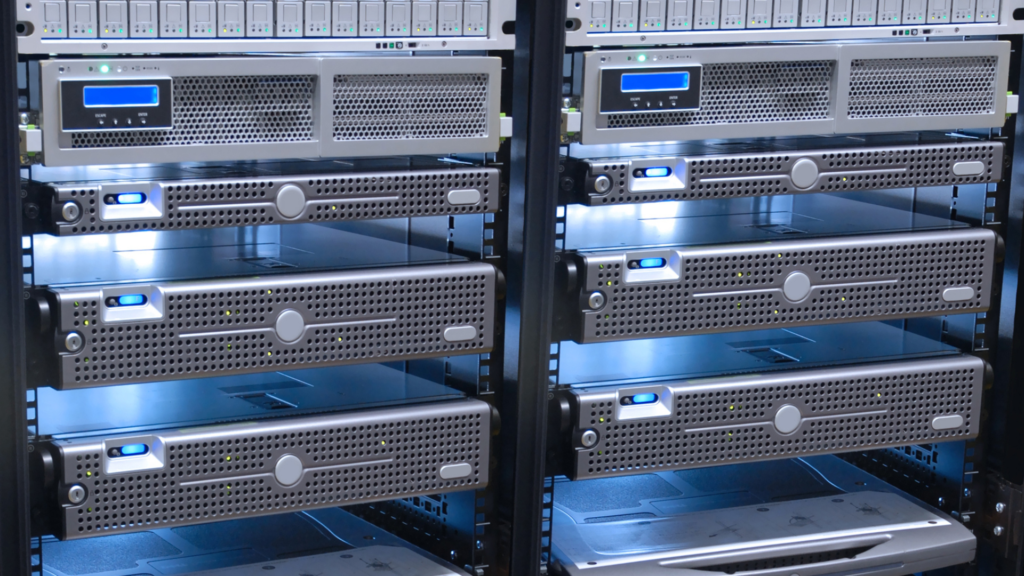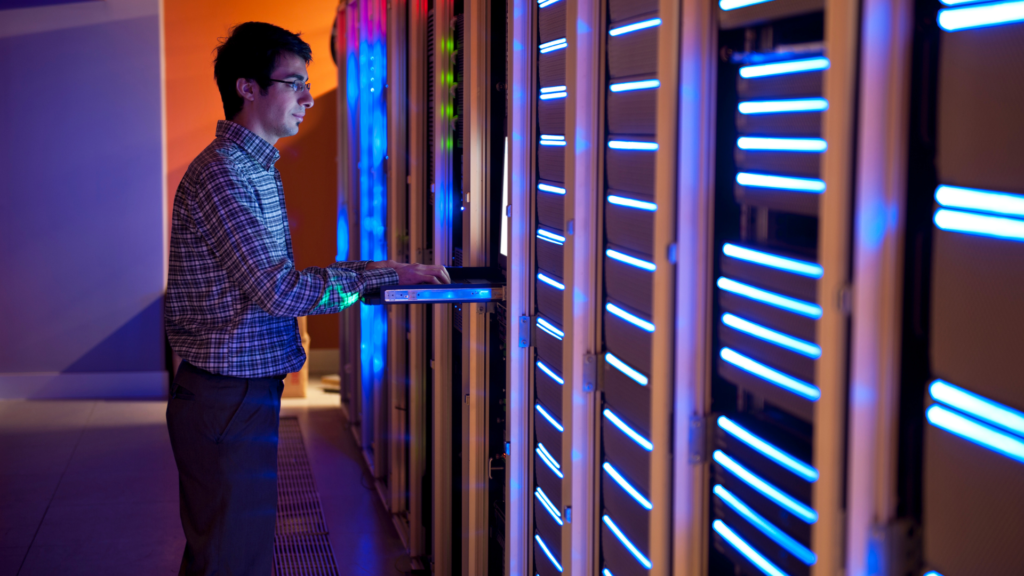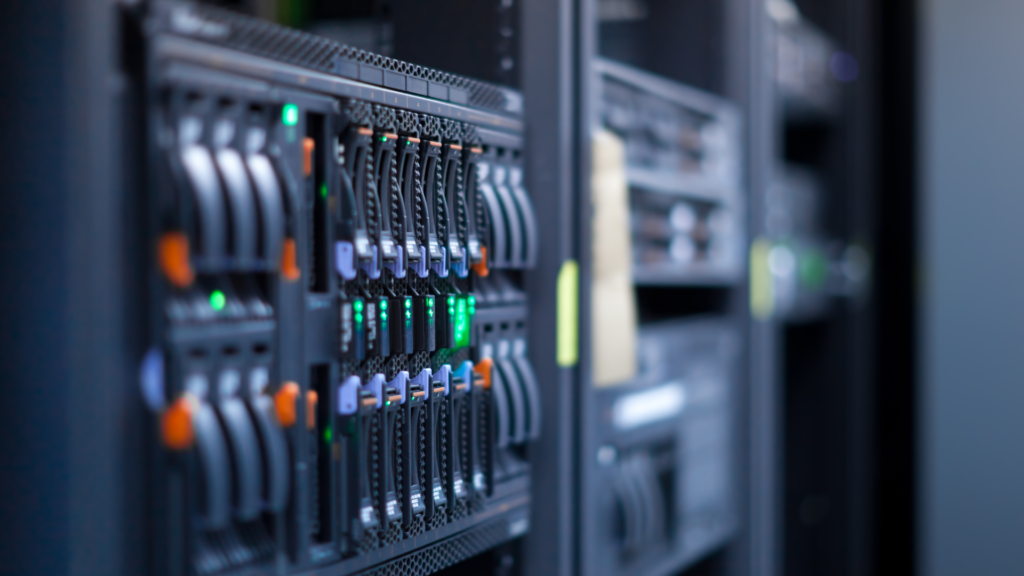
Table of Contents
The Benefits of Single-Server Colocation
In today’s digital landscape, businesses constantly seek efficient, scalable, cost-effective solutions to manage their server infrastructure. One solution that has increasingly become a favored choice is single-server colocation, which offers an alternative to traditional on-premise hosting.
Brightlio, as a seasoned colocation broker, helps companies transition to colocation services. This article delves deep into single-server colocation, providing insights tailored especially for businesses contemplating a move from their own data centers or small enterprises gearing up to collocate their inaugural server.
What is Single-Server Colocation?
Colocation is renting space, power, and connectivity from a third-party data center where you can house your servers and other IT hardware. Brightlio’s “Ultimate Guide to Colocation” is a great resource to learn more about the basics of colocation.
Single server colocation, also called 1U colocation, refers to renting space for just one server rather than multiple racks or cabinets. This model is ideal for businesses that don’t require extensive infrastructure but still need the benefits of a data center. It is also ideal for latency-sensitive applications that benefit from being closer to the end user.

Top Benefits of Single-Server Colocation
Let’s explore some of the top benefits of single-server colocation.
Cost-Efficiency
Moving away from the expenses of maintaining an in-house data center can significantly improve a business’s bottom line. With 1U colocation, you sidestep costs like cooling, power backup systems, and security measures, which can be excessive for small businesses. With single-server colocation, these costs are incurred by the data center provider for your monthly fee.
Single-server pricing ranges from $50 to $200 per rack unit (RU) monthly, depending on the data center and location. The base service often includes a small amount of network connectivity and IP addresses. Setup fees vary but are usually minimal for 1U colocation, and sometimes there is no additional fee.
You can add additional bandwidth, cross-connects to other carriers, and other features to the base price. Some providers will offer the service monthly, while others require an annual contract. The team at Brightlio can make sure a better price for colocation services.
Enhanced Security
Data breaches or physical intrusions can spell disaster. Colocation providers secure your server through state-of-the-art security measures, from biometric access controls to 24/7 surveillance. For a small business or a company transitioning from an in-house setup, this level of security is often hard to achieve independently.
Additionally, colocation providers offer additional security services for their partial rack colocation offerings. These typically include denial of service (DDoS) protection and managed firewalls. You can obtain added security protection for your servers through an operational expense instead of investing in expensive hardware.

Optimal Performance & Connectivity
Superior connectivity is the cornerstone of modern businesses. Most colocation data centers are carrier-neutral. This means they allow multiple carriers to build into their facility. Carrier neutrality offers colocation customers numerous bandwidth options at more competitive prices. It also gives clients the ability to get carrier redundancy for high availability.
Additionally, most colocation providers will sell their own connectivity. Often referred to as “blended connectivity” or a “network blend,” the service sources bandwidth from a mixture of providers that the data center provider purchases at large volume discounts and then allocates to the customer. This approach offers a way to secure lower-priced internet at a data center, typically without incurring cross-connect fees.
Flexibility & Scalability
As your business grows, your server requirements may change. With 1U colocation, scaling up and down becomes more manageable. Power and connectivity can usually be added easily.
Additional space can often be added, but you should discuss this during the sales process with the provider. Some facilities are low on space or may require you to add additional equipment in another rack. This can be cumbersome and could incur cross-connect fees.
Onsite Support
Many data centers have 24x7x365 onsite technicians that can assist with basic troubleshooting like swapping power supplies, hard drives, and SFPs. This service is referred to as remote hands. Remote hands services provide a convenient way to address minor issues and save a trip to the data center.
Remote hands fees vary by provider. Rates between $150 and $300 per hour are typical. You may be able to negotiate a small number of remote hands hours into the monthly agreement.
If you would prefer a fully managed service, check with your colocation provider. Many providers will offer managed services for 1U colocation. A dedicated server may also be an option for you.

Leveraging Single Server Colocation for Edge Computing
Edge computing, characterized by data processing closer to its source, has revamped how businesses approach server infrastructure. Single-server colocation is at the forefront of this revolution.
Single-server colocation ensures minimized latency by allowing companies to position their servers strategically, which is pivotal for real-time applications. The process optimizes bandwidth usage, resulting in faster data transfers and cost savings but also enhances data security by reducing the number of networks data must traverse.
Furthermore, as businesses look to expand their reach in multiple locations without the high costs of establishing dedicated data centers, single server colocation emerges as an agile and cost-effective solution. In an era where real-time data processing and IoT devices proliferate, this combination is a crucial asset for businesses aiming to stay ahead of the curve.
Top U.S. Data Center Markets for Optimal Single Server Colocation
The best US data center markets for single server colocation largely depend on a business’s specific needs and preferences. Factors such as proximity, connectivity, economic considerations, and risk mitigation (e.g., natural disasters) play a crucial role. However, several prominent data center markets in the US are popular for single-server colocation due to their advanced infrastructure, connectivity options, and competitive pricing:
Northern Virginia (Ashburn)
Often dubbed as the “Data Center Capital of the World,” Northern Virginia is a central hub for data centers. Its proximity to major East Coast cities, the US federal government, and numerous tech companies make it a favored choice.
Dallas/Fort Worth, Texas
Texas boasts a stable power grid, a central location that’s relatively safe from natural disasters, and a burgeoning tech industry. Dallas is the largest market in the state and one of the fastest-growing cities in the US.
Silicon Valley, California
Silicon Valley is a global technology hub with data centers in San Jose, Palo Alto, and other cities. A point of presence in the region provides low-latency access to some of the world’s tech giants.
Chicago, Illinois
A central hub in the Midwest, Chicago offers excellent connectivity, particularly for businesses aiming to serve both coasts of the U.S. Chicago is also one of the cheapest colocation markets in the US.
Atlanta, Georgia
With a growing tech industry and its central connectivity point in the Southeast, Atlanta is emerging as a critical data center market. Atlanta is also home to 15 Fortune 500 companies, the third most of any city.

Seattle, Washington
Serving the Pacific Northwest, Seattle is a growing West Coast tech hub with connectivity to major Asian markets, making it attractive for businesses with trans-Pacific operations. Cooler weather in the region also drives down data center cooling costs, yielding better colocation pricing.
Miami, Florida
As a gateway to Latin America, Miami is a great data center location for businesses serving customers in South America or the Caribbean. Miami also features a rapidly growing technology sector, especially in the fintech and crypto markets.
New York/New Jersey
New York metropolitan area is a major financial and tech hub, making it attractive for businesses that need proximity to these sectors. Additionally, the region is well-connected to major European and Canadian markets.
Phoenix, Arizona
Being relatively safe from natural disasters and having a growing tech scene, Phoenix is becoming a sought-after location for data centers. Lower real estate costs and government incentives also drive down the cost of colocation services.
Portland, Oregon
Like Seattle, Portland serves the Pacific Northwest. It offers lower-cost electricity and an advantageous climate. The suburb of Hillsboro, OR, saw the most significant increase in data center power supply of any market in 2022.
While these markets are among the most prominent in the US, the “best” market for single-server colocation truly depends on a business’s specific requirements, such as desired latency, target audience, and budget. Companies should assess their needs thoroughly and consult with experts like Brightlio to make an informed decision.

Brightlio Delivers Single-Server Colocation Solutions
If you are ready to explore single-server colocation pricing options, Brightlio can help. As a telecommunications broker, we partner with a network of global providers to offer numerous partial rack colocation options. We also provide full racks, private cages, and suites.
We also offer network connectivity, public cloud, SD-WAN, unified communications, and advisory services. This lets us offer a holistic technology solution for your company’s needs.
Brightlio is committed to being your most trusted and responsive IT solutions provider. Get started on a quote today!
Frequently Asked Questions
What’s the difference between Single-Server Colocation and Bare Metal Server Hosting?
Single-server colocation involves renting data center space to house your own equipment. You own the server, and the device management is your responsibility. The colocation facilities offer the environment (power, space, cooling, and connectivity) to run it. It’s best for those with specific server configurations who want hands-on control over their hardware.
In contrast, bare metal server hosting lets you rent a dedicated servers from a hosting provider. A dedicated server is a physical server exclusively allocated to a single user or organization, ensuring full access to its resources without sharing.The provider owns and maintains the hardware, giving businesses a dedicated server’s performance without the upkeep or initial investment.
The right choice largely depends on your business needs, whether you prioritize hardware control and customization or convenience and minimized hands-on maintenance.
How are colocation services priced?
Colocation costs are primarily based on the space you rent from a colocation provider and your power and connectivity needs. The primary drivers of colocation pricing are the renting specific rack space (measured in units or ‘U’) within the data center, with varying rates depending on the provider and location. Power costs, another significant component, are determined by your server’s energy consumption, with some providers charging based on the circuit or amperage draw. Additionally, there might be a one-time setup fee when you begin your agreement, also called a non-recurring cost (NRC).
Extra charges clients may expect are professional services, IP addresses, redundant power, backups, monitoring, or advanced security features. It’s essential to clarify with your provider what’s included in the primary fee and what services might incur additional costs. As with most services, prices can vary, so clients should expect a range in costs and ensure they understand precisely what they’ll pay for before finalizing any agreement.
What are the different space options for colocation services?
Colocation providers offer a variety of space options to accommodate the diverse needs of their clients. There’s the unit-based space at the most basic level, with options like 1U or 2U. “U” stands for rack unit, a standard measure for rack space. A 1U server occupies a height of 1.75 inches in a standard rack, while a 2U server takes up twice that space.
For businesses with more extensive server needs, colocation providers offer half-rack and full-rack options. A half rack typically provides space for around 20-22U, while a full rack can house equipment that occupies around 42U to 48U of space. When choosing a space option, it’s essential to consider your current needs and potential future expansion, ensuring that your chosen space can accommodate any growth.
Recent Posts
Vancouver Data Centers: Colocation in the Pacific Northwest
Business Broadband Solutions: The Ultimate Guide
Let's start
a new project together



